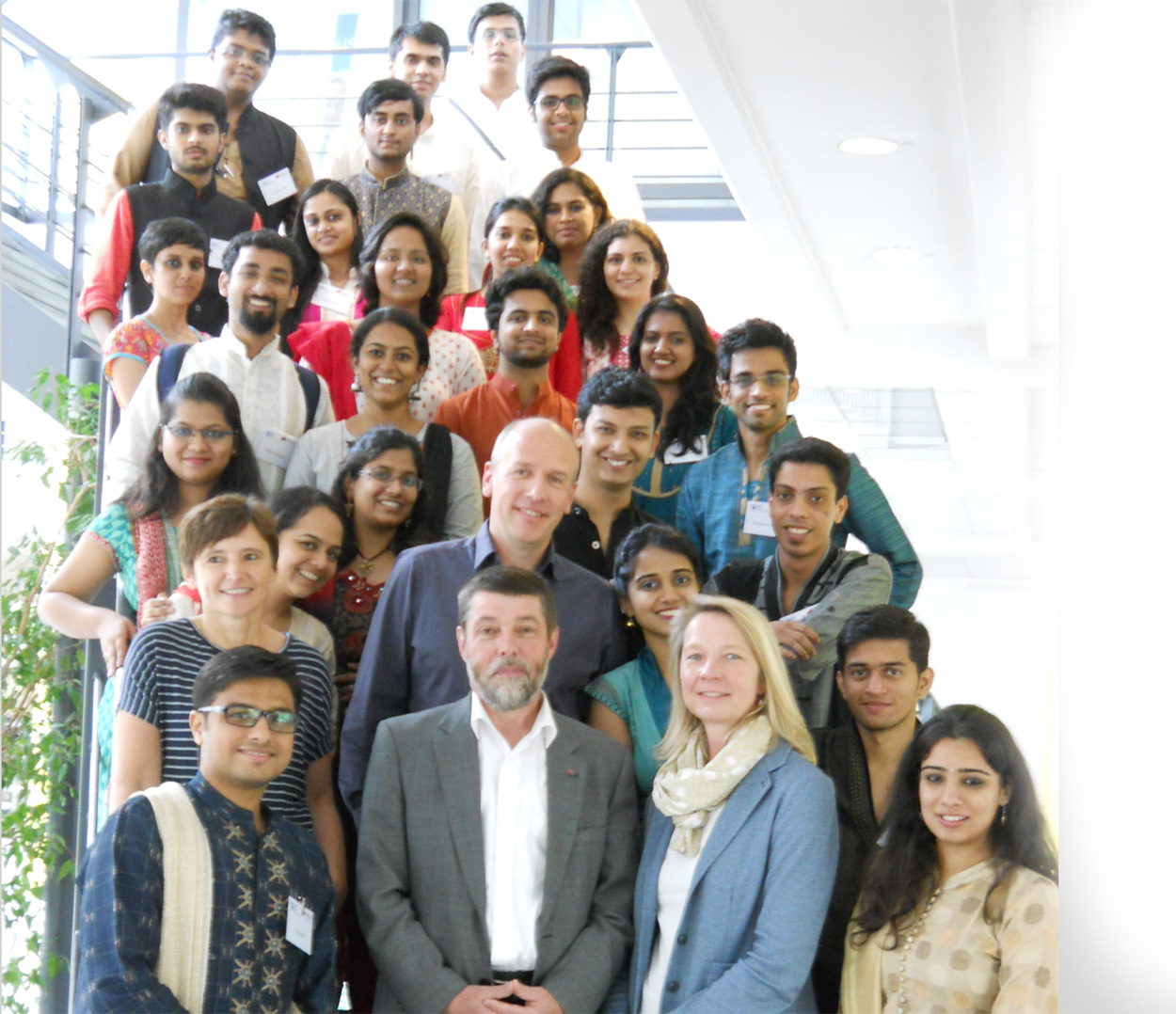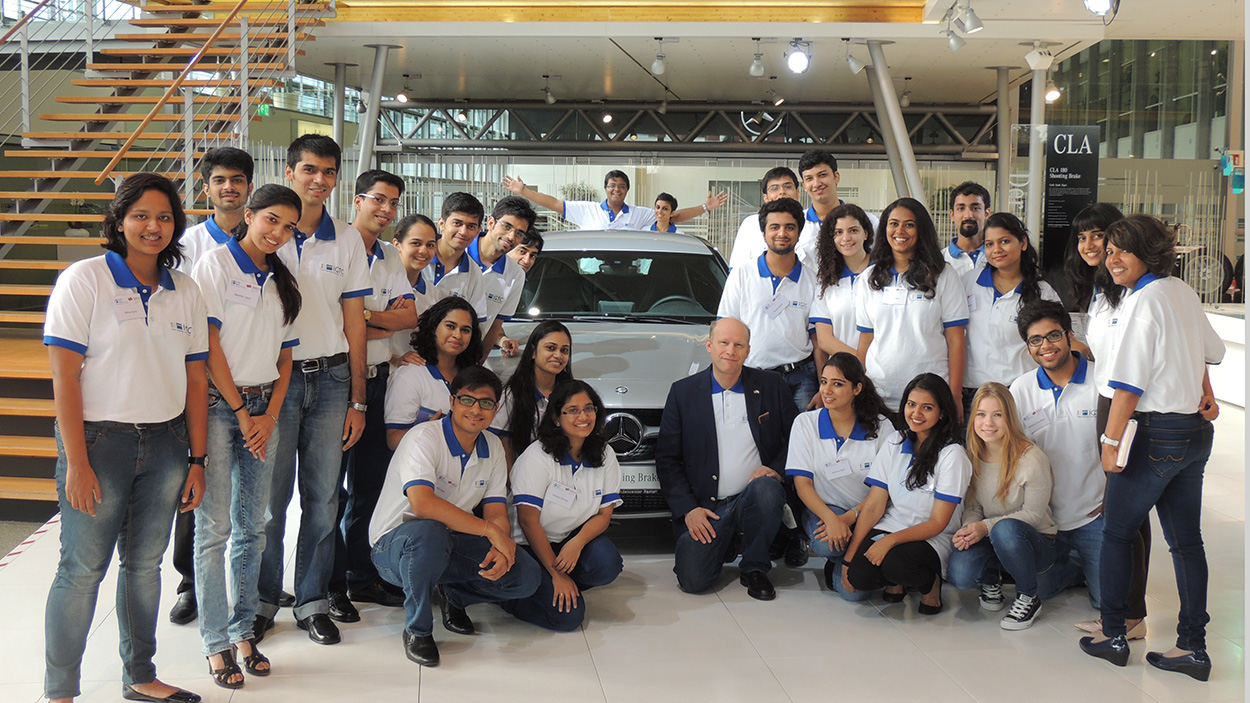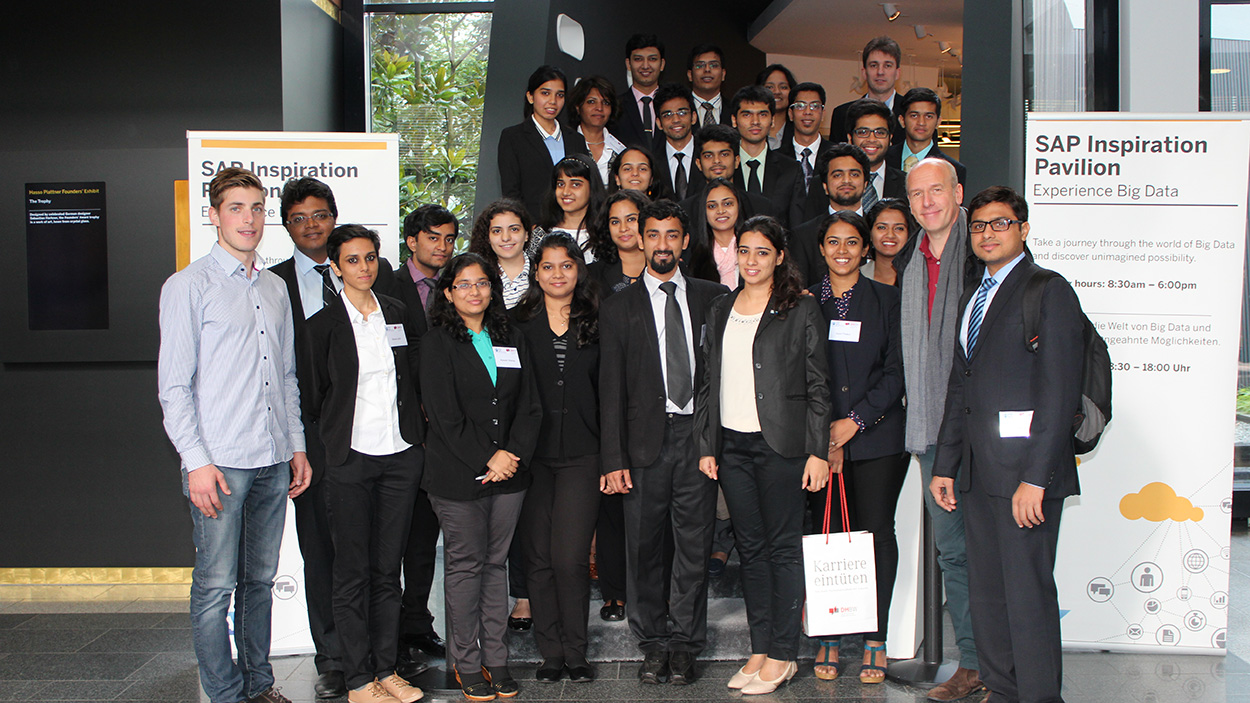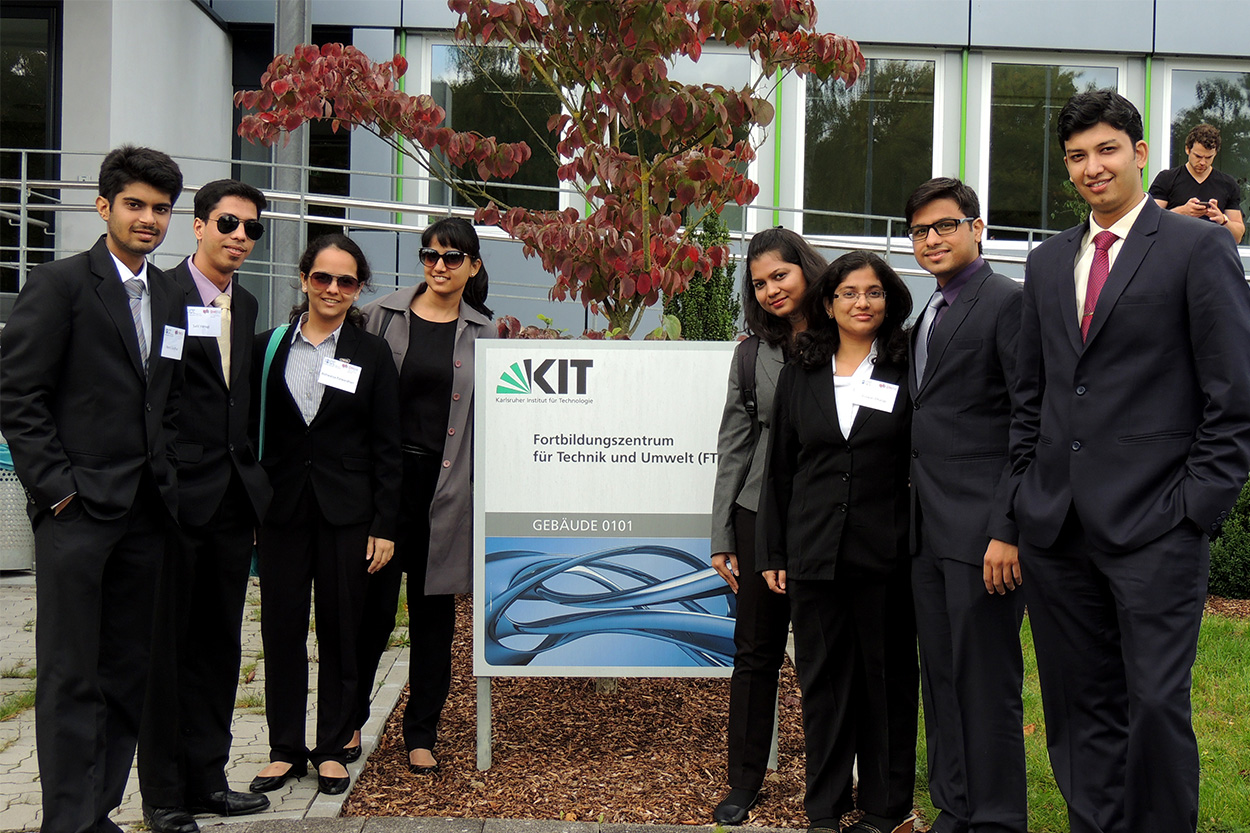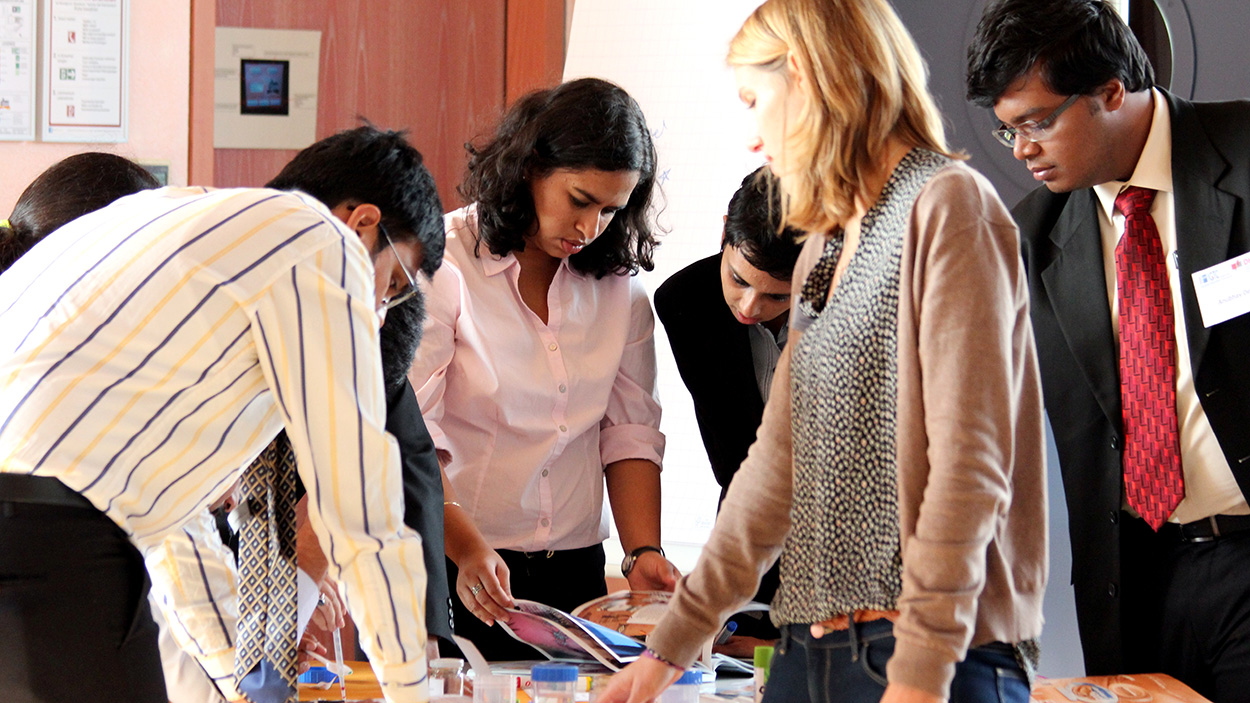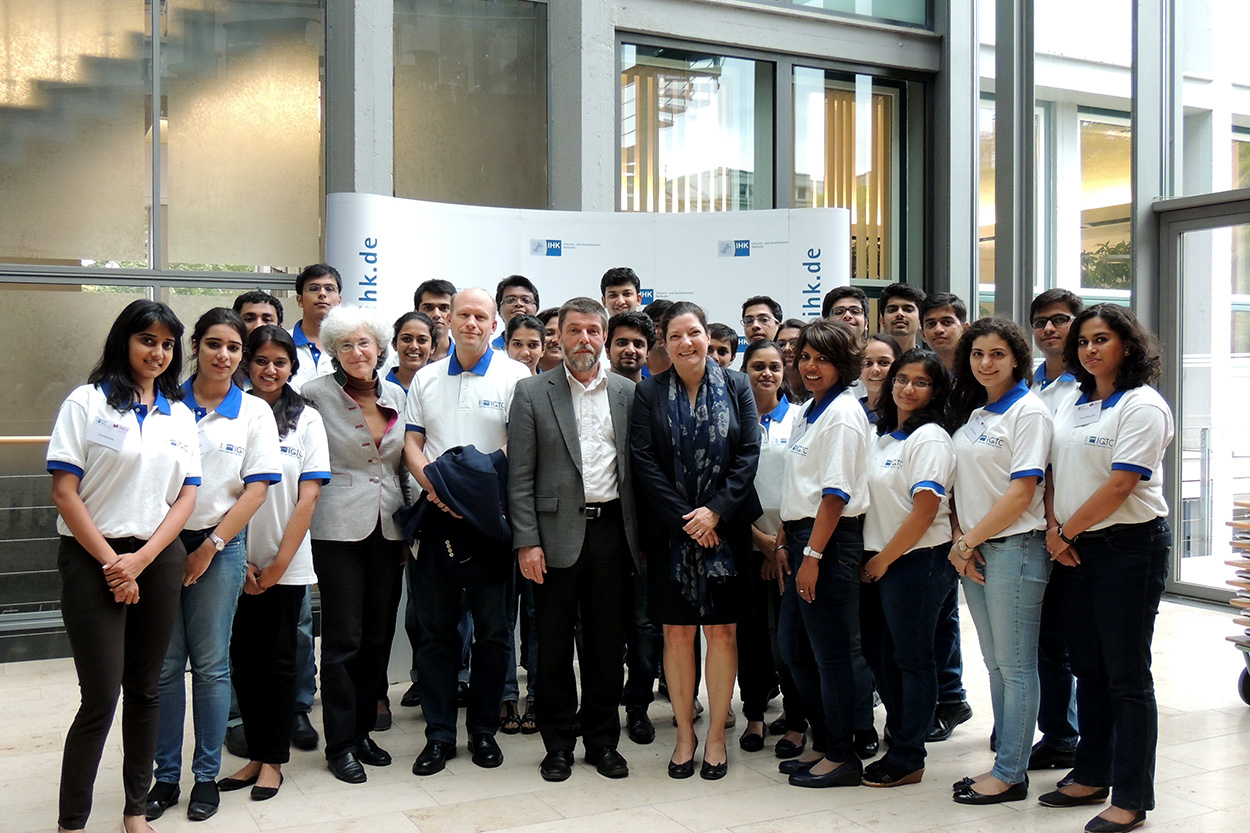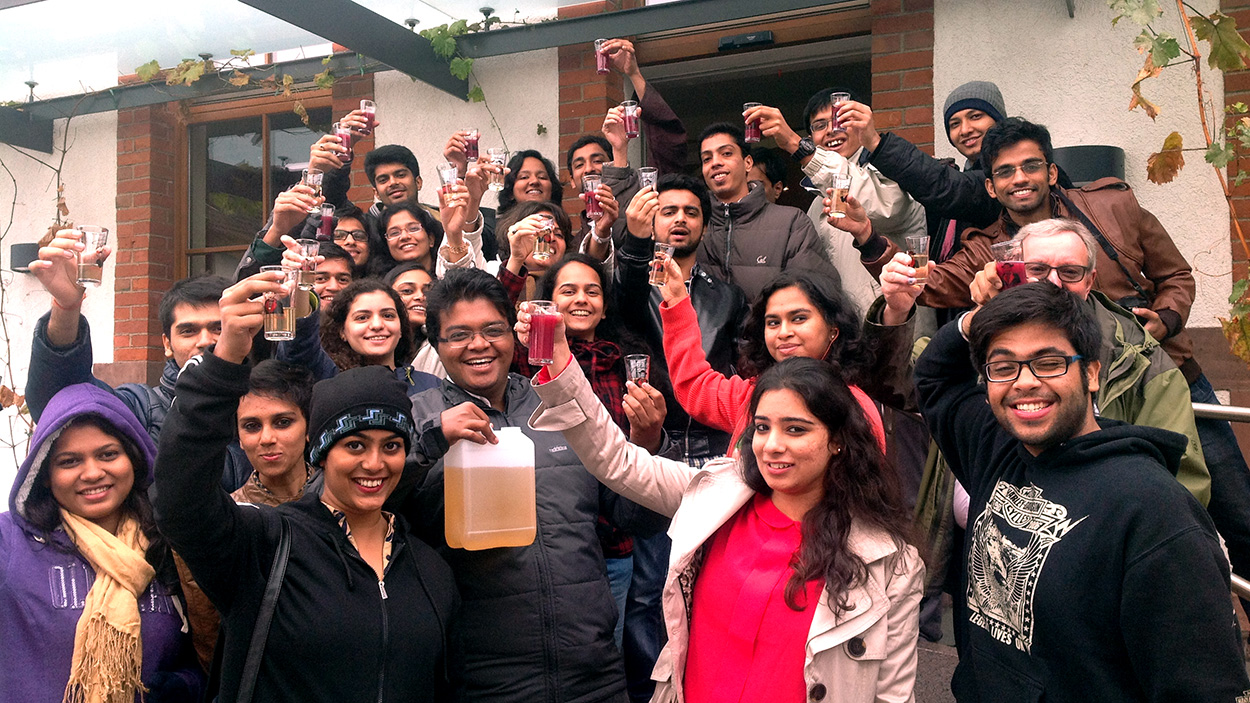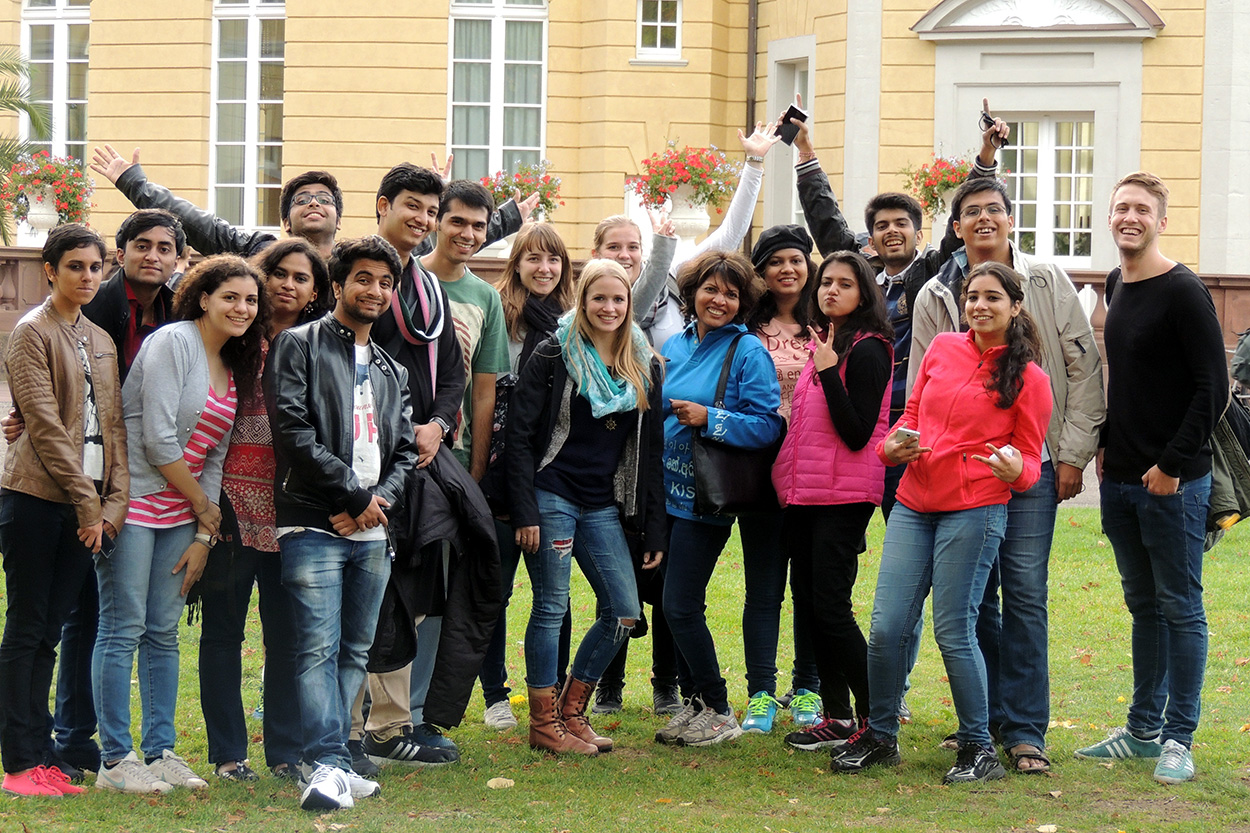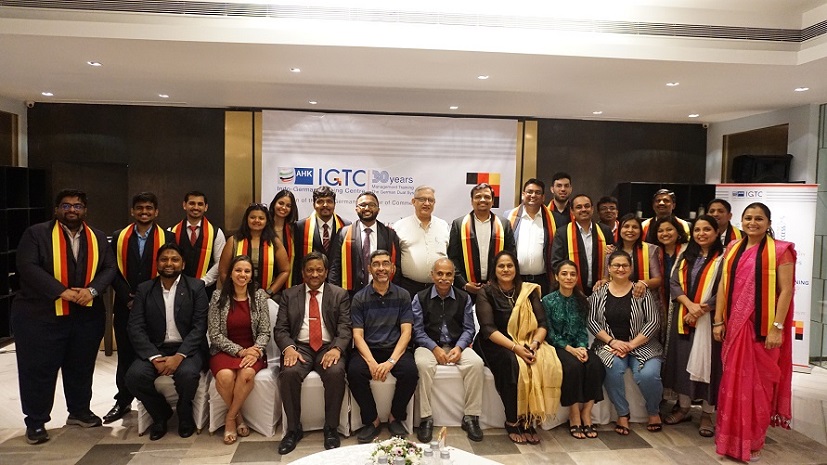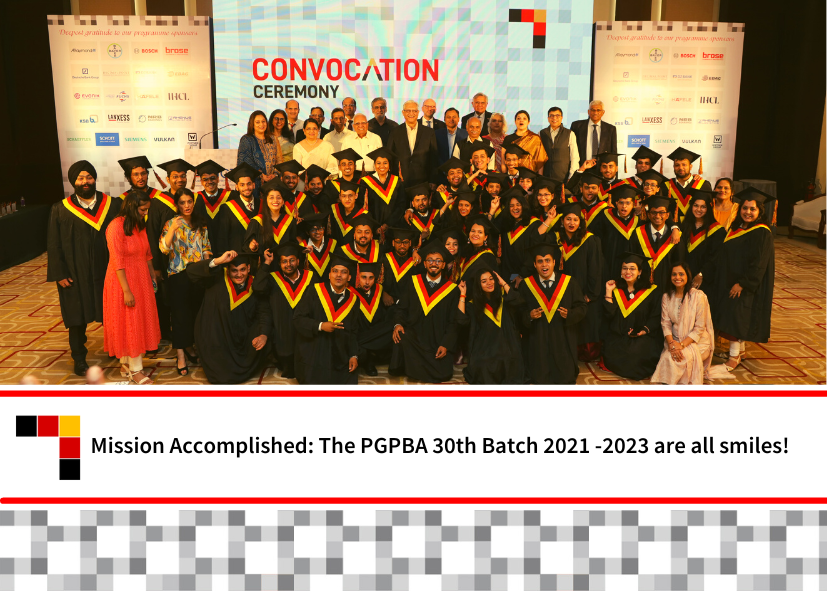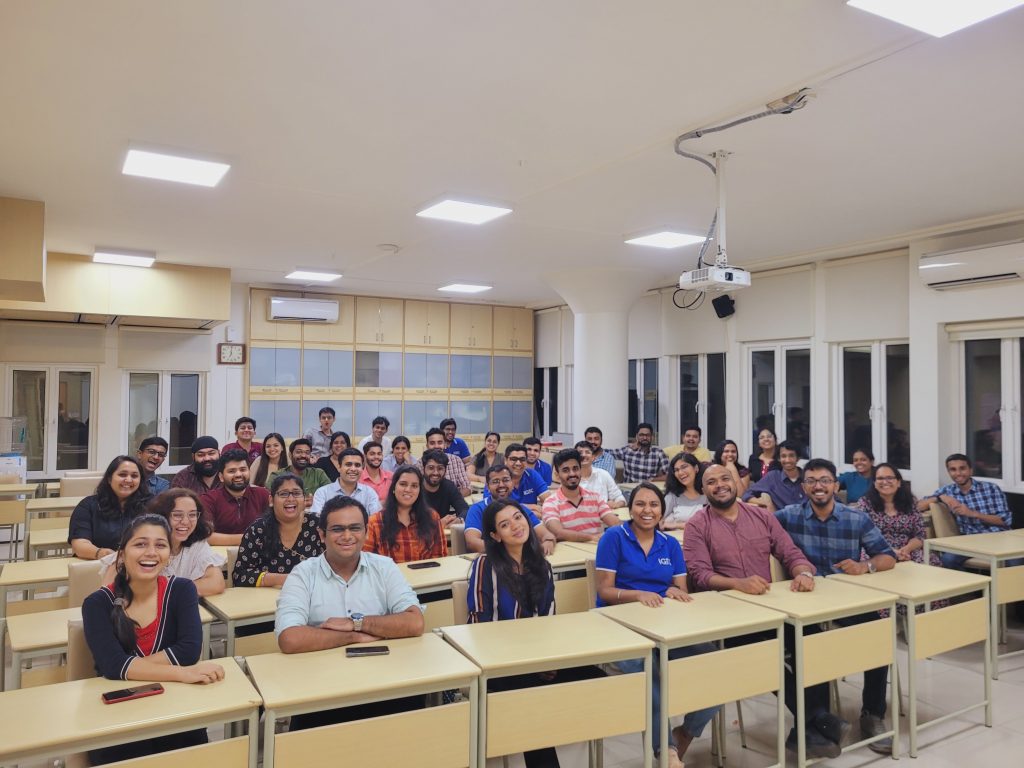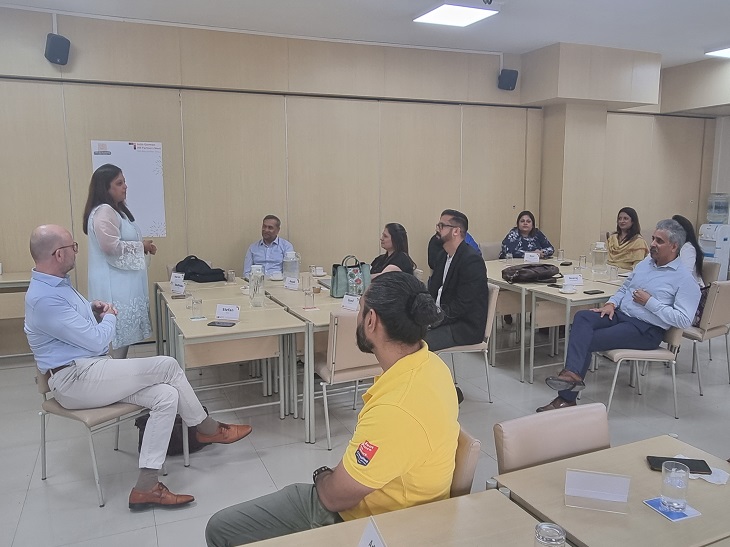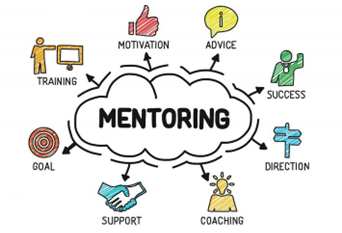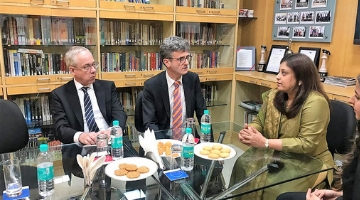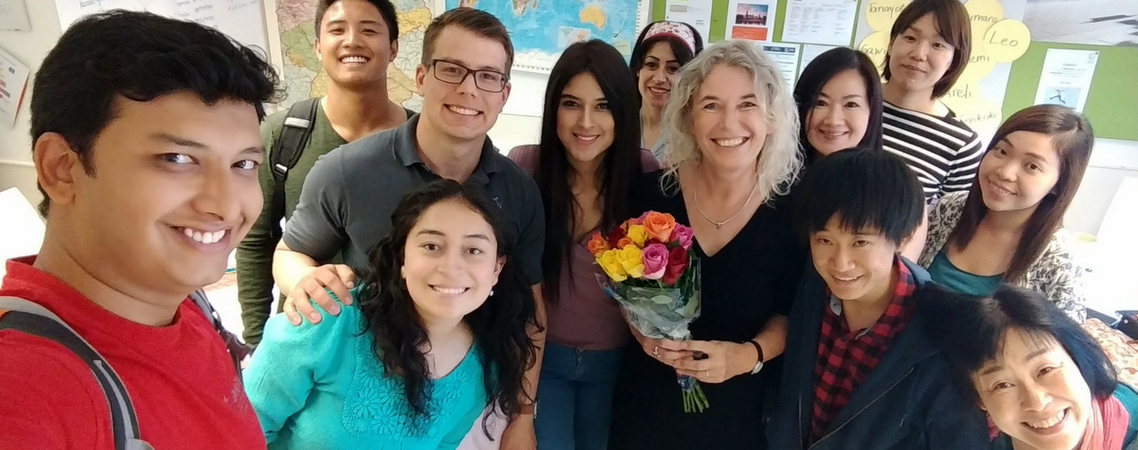For the 3rd consecutive year, IGTC’s partner university – Duale Hochschule Baden-Württemberg (DHBW) hosted 26 IGTC students from 3rd to 15th October 2015 in Karlsruhe, Germany. Just like the previous years, this exchange programme has become a highlight in the IGTC student’s life as it not only gives them an understanding of Germany’s business culture and its people but also memories, experiences and friendships that go way beyond the “academics” of life.
Harsh Sanghavi from the PGPBA Batch 2014-2016 Batch and Management Trainee with Mercedes Benz India quotes, “My father coerced me to take part in this trip. Today, I thank him profusely for his decision and wisdom, because had it not been for him, I would have missed the opportunity of a lifetime to experience Germany in such a profound and exhilarating way. I had the best time of my life all thanks to my father and IGTC!”
Here’s a narrative of the impactful intercultural visit as experienced by the students:
Willkommen in Deutschland
As our flight took off, close to a month’s worth of anticipation made time and distance seemingly fly past by our windows. Fifteen hours later, as we made our way to the bus bound for Karlsruhe, the driver warmly welcomed each one of us. This first glimpse of German hospitality kept getting embedded deeper through the duration of the programme. Our chef at the Jugendherberge Karlsruhe (Youth Hostel), had even looked up Indian recipes on the internet to somehow try to match our Indian palate. The professors patiently shared their professional and personal experiences with us and our German student-counterparts, with whom we instantly bonded as friends, completed the ‘international exchange’ and made us feel right at home.
Professor Volker Ihle, Dean of the Business and Engineering Programme at DHBW and Founding Director of IGTC Mumbai, welcomed us and gave a brief introduction on DHBW and Karlsruhe, ayoung city, aging close to three hundred years. He and his ever so efficient team organized an amazing programme for us – packed with a good balance of business and social lessons from an intercultural perspective.
Inspiring Guest Lectures
Our first formal lecture was with Mr. Rajiv Kumar, a senior International Project Manager at Siemens AG. Through topics such as investment management, decision making, project costing and crisis management in an “unconventional” market like Iraq, he gave us a glimpse of the factors one would need to consider while executing an international project. This was our first taste of internationalization, albeit from a broad, generalized perspective.
Communicating with people from different parts of the world was discussed through a lecture conducted by Dr. Sherida Altehenger Smith, an American professor married to a German and teaching at the DHBW. Her lively presentation on the different aspects of communication along with various interactive exercises made us realize the importance of being understanding and respectful of different cultures.
Mr. Ashutosh Kumar, Chief Business Consultant, Head of Mobile/UX Strategy Services for EMEA region, SAP Germany gave us a perspective on working for an MNC. He explained to us the nuances and scenarios involved in setting up a business in either India or Germany. At the end of his session he mentioned that even though Germany and India seem so different in many aspects but when it comes to business, both have the same fundamentals and values. This is why they are such strong partners in trade as well as culture.
Company and Institutional Visits: Be a Trend Maker, Not a Trend Taker
German companies as well as institutions are known to have mastered the art of “Being Trend Makers instead of Trend Takers”. Their approach, methodology and strategy were not just “eye-openers” but also made us understand why German companies are such industry leaders and giants. The emphasis and investments seem to be in R&D, in order to ensure highly quality, sustainable and niche products without compromising on the famous ‘Made in Germany” brand.
Siemens AG in Siemensalle, Karlsruhe, was our first company visit. Founded in 1950, as manufacturers of Printed Circuit Boards (PCB’s), they started off with providing for radios and televisions. Today, they continue to be one of the biggest technology drivers in the world, pushing the boundaries of globalization, urbanization and digitalization. The factory tour showed us that their focus was on manufacturing large and complex products with moderate volumes; approximately producing 800 different kinds of PCBs and industrial computers on 9 production lines. Thereafter we had a session on Total Integrated Automation (TIA) which provided more information on the aspects of process automation and manufacturing automation.
The Mercedes Benz factory in Rastatt, a nearly fully automated manufacturing plant was an “out of the world” experience. The sheer visual impact of seeing robots at work for four assembly lines – A, B, CLA and GLA class of vehicles – felt like being a part of a “science fiction” movie. A guided tour of each stage of the assembly of a car, showed us the “Fishbone System” and it’s enablement of Just-in-Time and Just-in-Sequence, inspiring ideas that can be implementable back home. The factory uses a variety of KUKA robots including the complex 6-axis/7-axis KUKA models. Other precision based processes like Lazer Brazing, Spot Welding, Stud Welding, Clinching etc. are also done by robots. We also saw the Siemens industrial computers at work!
From hardcore manufacturing, our journey took us to the 3rd largest software company in the world – SAP. The SAP Pavilion, designed to showcase the services of SAP in a “humanized” form through interactive gadgets and visuals, was a real treat. One cannot leave SAP without meeting HANA, an in-memory data platform that is deployable as an on-premise appliance, or in the CLOUD. These advanced ERP systems have been introduced in 2015 to further broaden the CLOUD technology platform and make the delivery of software easier to customers. The presentations by Mr. Ashutosh Kumar and Mr. Markus Bell focused on SAP’s Global Vocational Training and the Importance of Digital Businesses.
On the Technology, Research and Development front, we got a chance to visit the prestigious Karlsruhe Institute of Technology (KIT) – one of the top ranked institutes in the world. We saw first-hand how KIT caters to all research and development across the spectrum – be it from nano-technology to ‘Zebrafish’. The process of making fuel from ‘hay’ as a substitute for petrol and diesel is currently into development at KIT. In another world of science, KATRIN a massive super-cooled, electromagnetic particle accelerator is being built and worked upon to study the mass of a neutrino.
SEW Eurodrive, a family owned business but a market leader in drive technology with 79 Drive Technology Centres (DTC’s), uses full automation to manufacture all types of industrial gear systems for the B2B industry. SEW Eurodrive uses real-time part monitoring systems to check and verify their parts against defects. We also saw line following/self-guiding robots, made by ‘Eisenmann’ that pick up pallets from the source, navigate the route on their own to the destination without any input from the operator, and then place the pallets at the desired position. Another set of robots, ‘Lisa’ lift and place the pallets into the desired racks. In essence, SEW demonstrated to us how a company that operates on a global platform must implement the philosophy – “Think global, but act local.”
LAPP Kabel (Cables), another family owned business, is the leading manufacturer of copper cables, connectors and multi-purpose wires and truly a Stuttgart SME. In our minds, this was a delight from the operations management perspective where “theory met practice” – where fast and lean processes are at the center of the value system of the LAPP group. KANBAN, Jidoka, Vendor Management, Classical Re-order, High Deliverance, etc. are the activities on which the LAPP group emphasizes to maintain a fast pace in its production line.
DM – Drogerie Markt, an original Karlsruhe company, is a leading chain of supermarket stores dealing in cosmetics and healthcare products. At this visit, after an introduction to retail marketing, we were made to participate in an interactive activity. We were involved in a feedback process about its existing products – including suggestions and opinions about the design elements, across their product range to give us an understanding of branding in Germany. The highlight was the team exercise, wherein each team had to create and market their own products from scratch with raw material provided by them within an hour’s time.
The visit to the IHK, the German Chamber of Commerce and Industry in Karlsruhe gave us an understanding of how the Chamber of Commerce is an asset to any company seeking to set up business in Germany. The structure and provisions of IHK were described in great detail, to us by Mrs. Sonja Waldherr-Rummel, Sr. Aide Occupational Training Int’l with emphasis on the importance of the dual-system of education. She enlightened us as to how best we could maximize the advantages of the dual-system of education practiced at IGTC and incorporates it into our corporate lives.
The reception and meeting with the Erster Bürgermeiser (First Mayor) of Karlsruhe, Mr. Wolfram Jäger at the Mayoral Guest House gave us the experience of socializing and networking amongst the political establishment. He will be visiting Mumbai, India with the Karlsruhe delegation in January 2016 and we extended an invitation to visit IGTC during that time.
Cultural Highlights
In Karlsruhe, we explored the city extensively especially the shopping malls! The Schloss Bruchsal, an ornate 18th century Baroque palace was a splendid example of how the country preserves its architecture, culture, heritage and history. In Heidelberg, the quaint little tourist and student city, our tour guide was a Senior Citizen who put all of us to shame with her abundant energy and enthusiasm. We also got to see a live wedding shoot and an impromptu street music performance by our very own classmates! Thanks to Europe’s steepest, and most technically advanced, funicular railway, we conquered the landmark Merkur Mountain of Baden-Baden, located at an altitude of 2,191 feet.The view from there was literally breath-taking. In Stuttgart, we were lucky to experience the last weekend of the Oktoberfest. The jaw dropping rides, food, music and hoards of people made us feel right at home. The visit to the famous Mercedes Benz Museum made us fall all over again “in love” with “The Star”. To show off our sporting skill, we visited The Kletterpark – a multi-tasking outdoor adventure sports activity centre. At the Black Forest we not only got to see the making of a Black Forest cake but also visited the Open Air Museum Vogtsbauernhof- a live demonstration of how people lived and worked in Black Forest farmhouses during the last 400 years.
Auf Wiedersehen and Danke Schoen
All good things have to come to an end and after 13 exciting and enriching days, we said “Tschüß” to Germany and our lifelong friends. Now we look forward to saying “Swagat” to the DHBW Business Environment Mumbai, India delegation in January 2016!
Contributed by: Anubhav Deb, Pankaj Murali and Rohan Raj (2015-2017 Batch)

